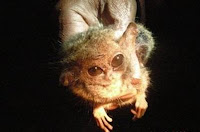 WASHINGTON (Reuters) – On a misty mountaintop on the Indonesian island of Sulawesi, scientists for the first time in more than eight decades have observed a living pygmy tarsier, one of the planet's smallest and rarest primates.
WASHINGTON (Reuters) – On a misty mountaintop on the Indonesian island of Sulawesi, scientists for the first time in more than eight decades have observed a living pygmy tarsier, one of the planet's smallest and rarest primates.Over a two-month period, the scientists used nets to trap three furry, mouse-sized pygmy tarsiers -- two males and one female -- on Mt. Rore Katimbo in Lore Lindu National Park in central Sulawesi, the researchers said on Tuesday.
They spotted a fourth one that got away.
The tarsiers, which some scientists believed were extinct, may not have been overly thrilled to be found. One of them chomped Sharon Gursky-Doyen, a Texas A&M University professor of anthropology who took part in the expedition.
"I'm the only person in the world to ever be bitten by a pygmy tarsier," Gursky-Doyen said in a telephone interview.
"My assistant was trying to hold him still while I was attaching a radio collar around its neck. It's very hard to hold them because they can turn their heads around 180 degrees. As I'm trying to close the radio collar, he turned his head and nipped my finger. And I yanked it and I was bleeding."
news source of www.news.yahoo.com

